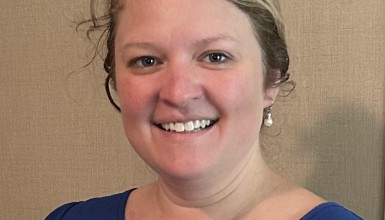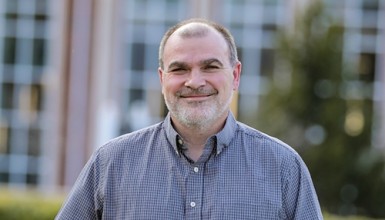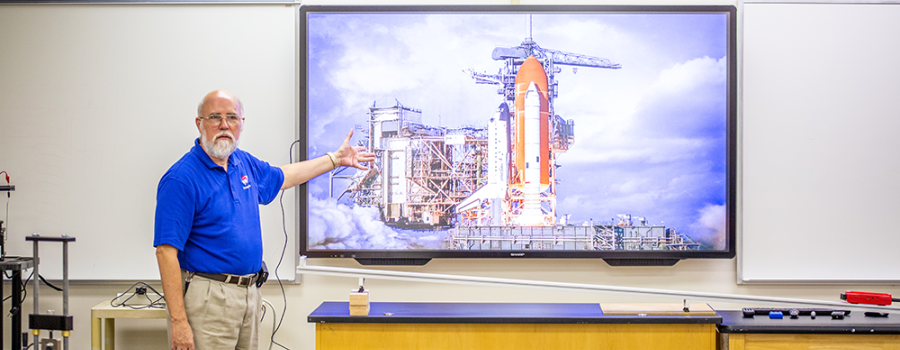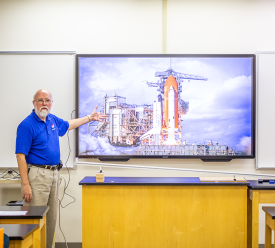Applied Physics – your gateway to bridging theoretical physics with practical engineering applications.
Earn your Bachelor of Science in Applied Physics at University of the Cumberlands and gain the knowledge to connect the theoretical foundations of physics with real-world applications. With a curriculum emphasizing advanced mathematics, chemistry, and problem-solving, this applied physics bachelor’s degree program prepares you to pioneer innovative solutions in science, technology, and industry. Small class sizes, supportive faculty, and complimentary tutoring ensure you receive the personalized attention needed to thrive academically.
Throughout your studies, you’ll strengthen critical thinking, analytical reasoning, and communication skills that employers value across a wide range of career paths. Whether you plan to pursue graduate studies, enter the workforce, or explore opportunities in engineering, research, or technology fields in Kentucky, across the U.S., and abroad, a bachelor’s degree in applied physics from University of the Cumberlands sets you apart as a highly prepared and competitive professional.
By the Numbers
Programs & Requirements
* The credit hours listed on this page only reference the specific program requirements and is not reflective of the total hours necessary to receive your Bachelor of Science in Applied Physics. Cumberlands requires all students obtain a minimum of 60 hours for an associate’s degree and a total of 120 hours for a bachelor’s degree. Transfer and prior learning credits may be counted toward those totals.
To learn more about our General Education Requirements, please visit the page referenced below or explore our Academic Catalog.
Bachelor of Science in Applied Physics
The applied physics major is for students pursuing the dual-degree (3-2) engineering option and leads to two bachelor’s degrees. UC has a formal agreement with the University of Kentucky; however, other ABET-accredited engineering schools may be acceptable on a case-by-case basis. Engineering schools and individual branches of engineering require different core courses; applied physics majors are responsible for being familiar with these specific requirements. The curriculum nominally requires three years at UC and two years at UK; however, a variety of situations may affect this timeframe. UC recommends that students complete introductory engineering courses during the summer between UC and UK. Some engineering branches require additional (and maybe extensive) background in programming, chemistry, or biology that are beyond the required curriculum; thus, requiring more than five years.
Course Requirements
Note: The 3+2 partnership with University of Kentucky requires a minimum of 70 credit hours completed at Cumberlands followed by 32 hours at UK.
Mathematics Elective Courses 2 Courses from these options
Chemistry (4 hours)
IT Science (3 hours)
A Bachelor of Arts degree requires completing the same courses as a Bachelor of Science with the addition of completing one foreign language sequence through the intermediate level.
- FREN 131 Elementary French I
- FREN 132 Elementary French II
- FREN 231 Intermediate French I
- FREN 232 Intermediate French II
- SPAN 131 Elementary Spanish I
- SPAN 132 Elementary Spanish II
- SPAN 231 Intermediate Spanish I
- SPAN 232 Intermediate Spanish II
3+2 Pre-Engineering Partnership
The Applied Physics major is designed for students pursuing the dual-degree (3-2) engineering option, which leads to two bachelor’s degrees. While most Applied Physics majors transfer to the University of Kentucky, other ABET-accredited engineering schools may be acceptable, pending case-by-case approval. Because engineering schools and specific branches of engineering have varying core course requirements, Applied Physics majors are responsible for understanding the prerequisites of their intended program. The typical curriculum consists of three years at UC followed by two years at UK, though this timeframe may vary depending on personal circumstances. UC strongly recommends that students complete introductory engineering courses during the summer prior to transferring. Some engineering branches may require additional coursework (often in physics, mathematics, programming, chemistry, or biology), which can extend the time needed to complete both degrees. For those transferring to the University of Kentucky, completing the full UC general education curriculum qualifies students as UK Gen Ed Certified, allowing them to transfer those credits as a block rather than meeting UK Core requirements individually.
Take the Next Step
Mission & Goals
The mission of the applied physics degree program at Cumberlands is to provide a solid foundation for students to pursue successful careers in physics, engineering, mathematics, secondary education, and other related fields.
Cultivate critical-thinking skills
Develop skills in experimental physics
Apply physical principles
Expand knowledge in mathematics
Recognize your professional and ethical responsibilities
Applied Physics Careers & Outcomes
All stats from U.S. Bureau of Labor Statistics
Physicist or Astronomer: $147,450
Physicist or Astronomer: $147,450
Physicists and astronomers study the interactions of matter and energy.
Physics Teacher: $86,550
Physics Teacher: $86,550
Teach courses pertaining to the laws of matter and energy. Includes both teachers primarily engaged in teaching and those who do a combination of teaching and research.
Nuclear Engineer: $120,380
Nuclear Engineer: $120,380
Nuclear engineers research and develop projects or address problems concerning the release, control, and use of nuclear energy and nuclear waste disposal.
Electro-Mechanical Technologist: $60,360
Electro-Mechanical Technologist: $60,360
Electro-mechanical and mechatronics technologists and technicians operate, test, and maintain electromechanical or robotic equipment.
Physics Professor: $79,640
Physics Professor: $79,640
Postsecondary teachers instruct students in a variety of academic subjects beyond the high school level.
Mechanical Engineer: $95,300
Mechanical Engineer: $95,300
Mechanical engineers design, develop, build, and test mechanical and thermal sensors and devices.
Common Questions
An applied physics degree focuses on applying the principles of physics to solve real-world problems in science and engineering. This degree bridges the gap between theoretical physics and practical engineering applications, preparing students for various technical careers. It emphasizes advanced mathematics, chemistry, and problem-solving skills.
Typically, a Bachelor of Science in Applied Physics requires around 120 credit hours, including general education and program-specific coursework. This generally takes four years of full-time study, though students may transfer credits or apply prior learning to accelerate completion.
The applied physics program referenced is an on-campus program. It emphasizes hands-on learning and personalized support, which may be difficult to replicate in a fully online format. Prospective students should check with the institution for any hybrid or remote learning opportunities.
An applied physics degree can be a valuable investment, offering diverse career opportunities in fields like engineering, physics research, and technology development. With an average salary of $147,450 for physicists and astronomers, and growing industry demand, graduates are well-positioned for rewarding careers.
Graduates with an applied physics degree can pursue careers as physicists, nuclear engineers, mechanical engineers, or electro-mechanical technologists, among others. The degree also opens doors to roles in teaching or further academic pursuits, such as advanced degrees in physics or engineering.
To earn an applied physics degree, you must complete the required coursework, which typically includes general education, advanced mathematics, chemistry, and physics classes. The program involves both theoretical studies and practical applications. Interested students should apply to a program that offers the Bachelor of Science in Applied Physics.
Yes, an applied physics degree is highly relevant in the field of astronomy. Many physicists and astronomers utilize their understanding of physical principles to study the interactions of matter and energy in the universe, making this degree a solid foundation for pursuing a career in astronomy.
No, applied physics is not just engineering. While it shares many practical applications with engineering, it remains rooted in physics. Applied physics focuses more on understanding physical principles and using them to solve scientific and engineering challenges, whereas engineering typically focuses on designing solutions.
Yes, you can become an engineer with an applied physics degree, especially in fields like mechanical or nuclear engineering. The strong foundation in physics and problem-solving skills provided by the degree makes graduates well-suited for various engineering roles.
The choice between physics and applied physics depends on your career goals. Physics focuses more on theoretical and experimental principles, ideal for research roles. Applied physics emphasizes practical applications of those principles, making it better suited for those interested in engineering, technology, or industry-related careers.
Faculty Experts in Physics
Learn more about your future physics professors!

Amy Bowman

Debbie Pierce

Kenny Siler
Kenny Siler
Contact Information
Request Information
Ask us anything. We can handle it. And we'll do our best to get back to you quickly!

